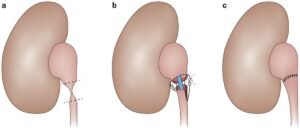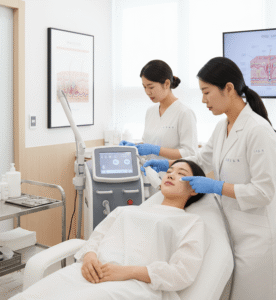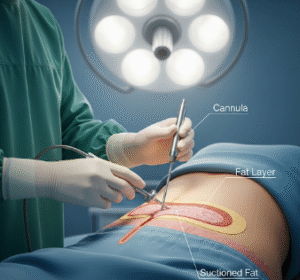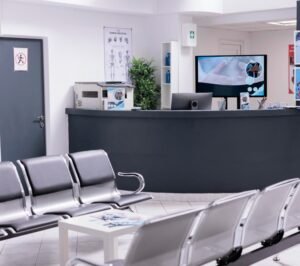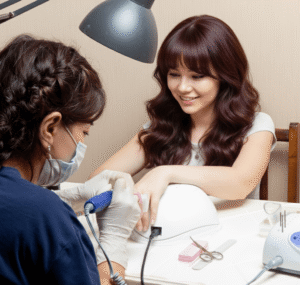What it is
In Vitro Fertilization (IVF) is an advanced fertility treatment where eggs are retrieved from a woman’s ovaries, fertilized with sperm in a laboratory, and the resulting embryo(s) are transferred back into the uterus.
✔️ Steps: Ovarian stimulation, egg retrieval, fertilization, embryo culture, and embryo transfer.
✔️ Goal: To achieve pregnancy when natural conception is not possible.
✔️ Coordination: In Korea, IVF coordination involves synchronizing tests, medications, procedures, and monitoring schedules to maximize success rates.
➡️ IVF coordination is managed by specialized fertility centers and reproductive endocrinologists in Korea, known globally for their high standards and advanced technology.
Why it’s done
IVF coordination is essential for couples or individuals facing:
🔹 Tubal factor infertility (blocked or damaged fallopian tubes).
🔹 Male factor infertility (low sperm count, poor motility, or abnormal shape).
🔹 Endometriosis interfering with natural conception.
🔹 Polycystic Ovary Syndrome (PCOS) with ovulation issues.
🔹 Unexplained infertility after failed IUI or ovulation induction.
🔹 Genetic concerns where preimplantation genetic testing (PGT) may be used.
💡 Highlight: IVF coordination ensures timely and precise management, which is key for successful outcomes.
Alternatives
Before IVF, other fertility treatments may be considered:
➡️ Ovulation induction – using medication to restore ovulation.
➡️ Intrauterine insemination (IUI) – less invasive, often tried first.
➡️ Lifestyle modifications – weight management, nutrition, and stress reduction.
➡️ Traditional Korean medicine – acupuncture and herbal remedies to support reproductive health.
⚠️ Note: IVF is generally recommended when less invasive treatments have failed or when urgent fertility solutions are required.
Preparation
IVF coordination in Korea involves a structured preparation phase:
✔️ Comprehensive fertility evaluation – hormone tests, ovarian reserve testing (AMH), semen analysis, ultrasound scans.
✔️ Medical screening – infectious disease tests, thyroid function, and uterine assessment.
✔️ Lifestyle counseling – guidance on diet, supplements, exercise, and stress reduction.
✔️ Synchronization of cycles – may involve birth control pills or hormone injections to align timing.
✔️ Financial and emotional planning – as IVF requires commitment in both areas.
💡 Tip: Korean clinics provide personalized treatment schedules, making coordination smoother and less stressful for patients.
How it’s done
IVF coordination in Korea follows these structured steps:
- Ovarian stimulation
- Daily hormone injections for 8–12 days.
- Ultrasounds and blood tests monitor follicle growth.
- Egg retrieval (oocyte pick-up)
- Performed under light anesthesia.
- Eggs collected through a thin needle guided by ultrasound.
- Sperm collection and preparation
- Partner’s or donor’s sperm is processed to select healthy sperm.
- Fertilization in the lab
- Conventional IVF (mixing eggs and sperm) or ICSI (injecting a single sperm into each egg).
- Embryo culture and monitoring
- Embryos are grown for 3–5 days in specialized incubators.
- Advanced labs in Korea use time-lapse imaging to monitor development.
- Embryo transfer
- 1–2 embryos placed into the uterus using a thin catheter.
- Remaining healthy embryos may be frozen for future use.
- Post-transfer care
- Progesterone support provided.
- Pregnancy test done 10–14 days after transfer.
💡 Highlight: Korean fertility centers are equipped with cutting-edge labs and monitoring systems, improving success rates significantly.
Recovery
Recovery from IVF coordination is straightforward but requires emotional and physical support:
✔️ Egg retrieval – mild cramping or bloating for a few days.
✔️ Embryo transfer – no downtime, normal activities can resume.
✔️ Emotional stress – common during the waiting period.
✔️ Multiple cycles may be needed, depending on results.
When to revisit a doctor:
➡️ Severe abdominal pain or bloating (possible ovarian hyperstimulation).
➡️ Fever or unusual discharge after retrieval or transfer.
➡️ No pregnancy after several cycles – alternative options may be discussed.
💡 Important: Korean clinics emphasize continuous follow-up with fertility counselors to support patients throughout the journey.
Treatment option in Korea
Korea is one of the most advanced destinations for IVF due to:
⭐ High success rates supported by modern technology and experienced specialists.
⭐ Affordable treatment packages compared to Western countries.
⭐ Comprehensive care including genetic testing (PGT), embryo freezing, and donor programs.
⭐ Integration with traditional Korean medicine for cycle support and stress relief.
⭐ Multilingual services at major fertility hospitals for international patients.
💡 Highlight: IVF coordination in Korea is highly structured, technologically advanced, and patient-focused, making it one of the top fertility care options globally.
Key Highlights
✔️ IVF involves egg retrieval, fertilization, and embryo transfer.
✔️ Coordination ensures precise timing, monitoring, and support.
✔️ Preparation includes hormone testing, lifestyle counseling, and cycle synchronization.
✔️ Recovery is quick, with most women resuming normal activities within days.
✔️ Korean fertility centers provide advanced, affordable, and holistic IVF care.


